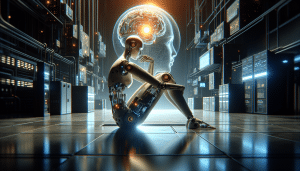Why Quantum Computing May Change Everything for You
Aiden Foster August 29, 2025
Quantum computing is stirring up excitement across tech and science fields thanks to its potential to solve problems beyond the reach of classical computers. Explore how quantum technology could reshape industries, influence daily life, and why so many are eager to learn more about this transformative frontier.
What Makes Quantum Computing So Different?
Imagine a computer that can tackle calculations which would normally take thousands of years in just a few seconds. That’s the bold promise often cited when discussing quantum computing. Traditional computers rely on bits—simple 0s and 1s—to process data. Quantum computers, on the other hand, use quantum bits, also called qubits, which can exist as 0, 1, or both simultaneously. This quality, known as superposition, enables an exponential leap in processing power for the right kinds of problems. For those interested in cryptography, logistics, or complex simulations, quantum technology could play a pivotal role in the coming years.
Another concept making quantum systems unique is entanglement. In this state, quantum particles connect so that the state of one instantly affects the state of another, even if separated by vast distances. This strange phenomenon assists quantum computers in outperforming conventional devices for tasks like optimizing supply chains or simulating molecules for new medicines. Some scientists believe it’s these quantum phenomena that may propel breakthroughs in areas such as material science, drug discovery, and financial modeling, opening doors once thought unimaginable (Source: IBM).
Quantum technology also offers the chance to rethink data security. Today’s encryption methods would be vulnerable if large-scale quantum machines became operational. As a result, companies and experts are racing to develop quantum-safe cryptography. In the future, those working in cybersecurity may need to adapt rapidly to these changes. Understanding how quantum tech operates, from error correction to algorithm design, can be important for everyone interested in the intersection of science, technology, and society.
Industries Poised for Quantum Leap
Quantum computing’s most talked-about benefit is the potential impact across major industries. Finance firms are investigating how quantum algorithms may power risk analysis and trading optimization. Because quantum systems process data in parallel, they can rapidly analyze countless scenarios—something traditional machines find cumbersome. Beyond finance, logistics and supply chain companies explore quantum models for faster route optimization and resource allocation, opening up cost-saving opportunities (Source: McKinsey).
Healthcare and pharmaceuticals are keenly interested in advances from quantum computing. Simulating the behavior of molecules, proteins, or even entire cells is computationally intensive. Quantum computers may enable far more accurate modeling, helping researchers identify promising new treatments and design drugs more efficiently. This could also accelerate discoveries in genetics and precision medicine, tailoring care to individual needs (Source: Nature).
Even energy and environmental sectors see promise in quantum tech. From optimizing energy grids to advancing renewable fuel research, quantum models could streamline solutions for pressing global challenges. Large technology firms and research institutions actively collaborate to integrate quantum approaches into industry workflows. Keeping an eye on these developments helps individuals and businesses anticipate new possibilities and adapt to evolving technologies.
Challenges and Realistic Expectations in Quantum Computing
The path to quantum advantage—where quantum computers outperform the best classical supercomputers—is complex. Current quantum devices, often called noisy intermediate-scale quantum (NISQ) computers, are impressive but limited by errors and environmental interference. Qubits are notoriously fragile and can easily lose their quantum state, leading to computation errors. Research in quantum error correction and hardware stabilization continues at a brisk pace, but commercial-scale quantum solutions remain a work in progress (Source: NIST).
There’s also significant debate on the timeline for practical applications. While algorithms like Shor’s algorithm (for factoring large numbers) and Grover’s search algorithm reveal tantalizing possibilities, most current breakthroughs are highly specialized and perform best on certain mathematical problems. This means quantum computing is unlikely to replace all traditional computing anytime soon. Instead, hybrid models combining quantum processors with classical hardware are seen as a more realistic near-term approach for many early adopters.
Public understanding sometimes lags behind the headlines. While investment in quantum research continues to accelerate, expectations should be grounded in current scientific reality. Staying informed about actual capabilities and milestones is the best way to appreciate the field’s evolution without falling for exaggerated claims. Reliable information from academic centers and agency reports can help users distinguish real progress from speculation.
Preparing for Quantum Careers and Skills
The quantum revolution is already generating demand for specialized talent. Fields like quantum information science, quantum engineering, and quantum programming are emerging as key areas of expertise. Universities and online education hubs are responding with targeted coursework and degree programs focused on the next generation of quantum leaders. Those interested in staying competitive may benefit from exploring foundational topics in quantum mechanics, computer science, and advanced mathematics (Source: Quantum.gov).
Practical training is becoming available through research internships, university-industry collaboration, and publicly accessible quantum platforms. Some companies now offer cloud-based interfaces to real quantum hardware, enabling students and professionals to experiment and test algorithms without needing a physical lab. Early exposure to quantum principles can be an advantage, especially as more organizations seek workers capable of understanding and communicating complex technical information across teams.
Many quantum skills overlap with those required in traditional computer science and data analysis. Being familiar with programming languages (like Python), algorithms, and logic helps set a foundation. But as quantum software development grows, new frameworks and tools specifically designed for quantum applications will require continuous learning. Lifelong curiosity and adaptability could prove as important as technical skills in this dynamic field.
Quantum Computing and the Future of Cybersecurity
Cybersecurity experts are closely monitoring quantum computing’s effect on data protection. Algorithms commonly used today—like RSA and ECC—rely on the mathematical difficulty of factoring large numbers. Quantum computers, in theory, could solve these problems more efficiently, making current encryption methods obsolete. Governments and industry leaders actively develop post-quantum cryptography—algorithms resilient to quantum-attacks—with the goal of safeguarding data in the quantum era (Source: NIST CSRC).
Transitioning to quantum-resistant algorithms won’t be instantaneous. The process involves updating hardware, software, and protocols—often on a global scale. Organizations are encouraged to begin migration planning early, evaluating which assets require post-quantum protections. Security professionals studying quantum trends may be better equipped to lead these changes or provide valuable guidance to institutions navigating this shift in technology.
Individuals can also stay informed by following cybersecurity agencies and open standards groups, which regularly issue updates about cryptographic protocols and emerging threats. Taking basic steps, like using stronger password managers or exploring two-factor authentication, remains crucial even as quantum competitors emerge. The future of secure communication very likely depends on the successful integration of both classical and quantum safety techniques.
How Quantum Computing Could Influence Everyday Life
Most people may never build or program a quantum computer, but the technology’s ripple effects could touch almost every aspect of society. Imagine precision-designed pharmaceuticals developed in months instead of years. Faster weather simulations leading to more accurate disaster forecasts. Or speedier supply chains that reduce food waste and save energy. These examples illustrate just a few ways quantum innovations might shape experiences and opportunities for individuals and businesses alike (Source: Brookings Institution).
There’s growing attention to the ethical and social implications. With great computational power comes the potential for both societal benefit and risk. Ensuring fair access to quantum resources, minimizing disparities, and anticipating unintended consequences present important challenges for policymakers. Collaborative efforts between technologists, lawmakers, and ethicists can help guide responsible development and deployment for everyone’s benefit.
Staying engaged with updates as this field evolves is a useful approach for anyone interested in technology’s larger impact. The journey from research labs to real-world applications may take time, but curiosity and preparation could help individuals, students, or professionals harness opportunities as they emerge. Quantum computing’s story is still unfolding—being informed is the best way to participate in its future.
References
1. IBM. (n.d.). What is quantum computing? Retrieved from https://www.ibm.com/quantum-computing/learn/what-is-quantum-computing/
2. McKinsey & Company. (n.d.). Quantum computing: Use cases. Retrieved from https://www.mckinsey.com/featured-insights/quantum-technology/quantum-computing-use-cases
3. Nature. (2019). Quantum computing in drug discovery. Retrieved from https://www.nature.com/articles/d41586-019-02936-3
4. National Institute of Standards and Technology. (n.d.). Quantum computing. Retrieved from https://www.nist.gov/pml/quantum-computing
5. Quantum.gov. (n.d.). Quantum workforce development. Retrieved from https://www.quantum.gov/workforce-development/
6. Brookings Institution. (n.d.). How quantum computing will transform our world. Retrieved from https://www.brookings.edu/articles/how-quantum-computing-will-transform-our-world/








